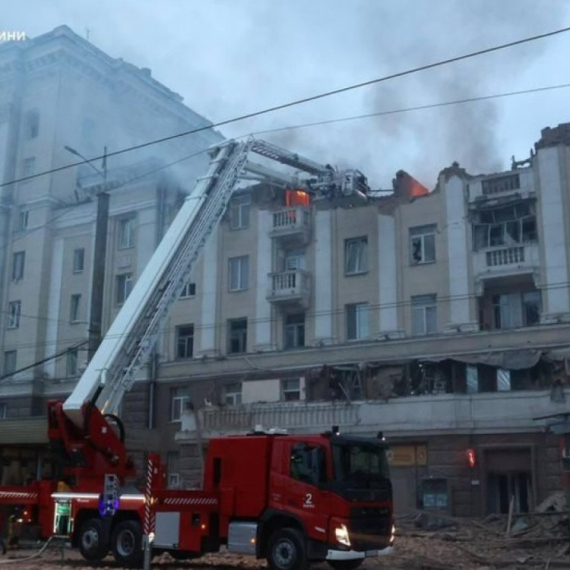Let’s keep what we spend in tune with what we earn
Monday, 13.10.2008.
11:40

Let’s keep what we spend in tune with what we earn I would particularly like to focus on one of the most sensitive issues dealt with in the budget – the wage bill. Let me immediately state one of the basic rules of economics: wages increases need to be earned. Put another way, wages should only rise if productivity rises too. Defy this principle and a short-term gain becomes a long-term headache. In the nineties Serbia reaped the treacherous rewards that came from spending beyond her means. That is, the people of Serbia paid the price for paying themselves more than what the economy produced. My country, Zimbabwe, is currently paying the identical price that Serbia paid in those unhappy days. I am not saying that Serbia is anywhere near close to the turbulence of the past, but am just injecting a note of caution that we don’t make idle promises to ourselves, resulting in the implementation of illusions that we can’t afford. Recent high levels of inflation - with all the negative impact that this could have on the country’s competitiveness, discouraging new investors from building new businesses and creating new jobs - should give us pause for thought. It is the public sector that is inclined to live beyond its means. The tax-payer picks up this bill, but much more importantly - given a common labor pool - public sector wages set the benchmark for wages throughout the economy, including those in the private sector. Who wouldn’t be happier working in a secure relatively high paid government job rather than slogging it out in the private sector? If the public wage is set too high relative to what the country itself is earning, it puts pressures on private sector salaries eroding the competitiveness of the goods and services we produce. A small clue that we may just be consuming too much relative to what we produce is the ever widening current account deficit. Perhaps even more compelling is the simple fact that the more public resources are eaten up by wages the less money there is available to invest in infrastructure (roads, railways, hospitals, schools…). Public sector investments are so important for ensuring that healthy Serbians have the skills necessary to compete in this increasingly volatile global economy; and for providing transport systems that support Serbia’s integration into Europe. So what is the story in Serbia? Public sector wage expenditures represent around 10 percent of country’s GDP, whereas in a sample of countries in Europe and Central Asia it averaged 6.3 percent. Only in Croatia do public sector wages represent a higher percentage of GDP at 11.1 percent. Further afield countries like Chile, Ireland, Korea, Spain or Thailand, renown for their ability to compete in world markets, all managed to keep their public wage-bill at around six percent of GDP. Moreover, some of Serbia’s neighbors have proved that change is possible. Romania spent 7.1 percent of GDP on non-enterprise public sector wages back in 1992 but brought it down to 4.9 percent by 2004. Slovakia, a country whose path to Europe Serbia perhaps would most like to emulate, spends some 5.9 percent of GDP on wages. Yes, I know comparisons can be odious, but take a look at the graph comparing Serbia’s per capita average salary to a varied sample of European countries. It tells the same story! It is perhaps a little unfair to focus on non-enterprise public wages when it seems to me that the real culprit in pumping up wages may be monopoly state - or municipally-owned enterprises. Let me give you an example. The average monthly wage in 2007 was around 70,000 dinars in a municipal company in Belgrade that manages leisure facilities. In another big Serbian city the average wage across a number of public utility companies is 72,000 dinars. The public company that collects garbage in this city has an average wage of 65,000 dinars. This is almost one and a half times the average wage in Hungary which over the same period stood at approximately 40,000 dinars. There is undoubtedly a very strong incentive to work in the public sector in Serbia. While net salaries in the private sector averaged 27,000 dinars over the period January to May 2008, those in state owned companies averaged 50 000 dinars, those in municipal companies 33,500 dinars and in public administration just under 40,000 dinars. This is not new news. As ever, Serbia knows what its problems are and there is no shortage of talented policy makers and technicians that could be mobilized to tackle the issues. Look at what government’s own May 2008 Memorandum of the Budget says: “Growth of salaries in public sector, including Republic and local public utility enterprises, will be under control and will be in line with the trends in productivity and labor market conditions. It is unjustifiable (my emphasis) for employees in monopolies to have substantially higher salaries than those paid for identical positions in the labor market, and that salaries in businesses keep increasing at a pace above average”. What is needed is commitment and follow-through on these policy pronouncements. These are testing times in Serbia as new budgets are drafted. Policy makers need the political and popular support to make it happen. So let’s help them make sure that spending rhymes with earnings. Simon Gray is World Bank Country Manager in Serbia Policy makers: The Social-Economic Council in session (Tanjug) “History may not repeat itself, but sometimes it rhymes” Mark Twain prudently cautioned a long time ago. Or, as Karl Marx used to say, “history repeats itself as a farce”. These insightful words should be uppermost in our minds as Serbia prepares its 2008 supplemental budget and its 2009 annual budget. Simon Gray "It is perhaps a little unfair to focus on non-enterprise public wages when it seems to me that the real culprit in pumping up wages may be monopoly state - or municipally-owned enterprises."
Let’s keep what we spend in tune with what we earn
I would particularly like to focus on one of the most sensitive issues dealt with in the budget – the wage bill. Let me immediately state one of the basic rules of economics: wages increases need to be earned. Put another way, wages should only rise if productivity rises too. Defy this principle and a short-term gain becomes a long-term headache.In the nineties Serbia reaped the treacherous rewards that came from spending beyond her means. That is, the people of Serbia paid the price for paying themselves more than what the economy produced. My country, Zimbabwe, is currently paying the identical price that Serbia paid in those unhappy days.
I am not saying that Serbia is anywhere near close to the turbulence of the past, but am just injecting a note of caution that we don’t make idle promises to ourselves, resulting in the implementation of illusions that we can’t afford.
Recent high levels of inflation - with all the negative impact that this could have on the country’s competitiveness, discouraging new investors from building new businesses and creating new jobs - should give us pause for thought.
It is the public sector that is inclined to live beyond its means. The tax-payer picks up this bill, but much more importantly - given a common labor pool - public sector wages set the benchmark for wages throughout the economy, including those in the private sector. Who wouldn’t be happier working in a secure relatively high paid government job rather than slogging it out in the private sector?
If the public wage is set too high relative to what the country itself is earning, it puts pressures on private sector salaries eroding the competitiveness of the goods and services we produce. A small clue that we may just be consuming too much relative to what we produce is the ever widening current account deficit.
Perhaps even more compelling is the simple fact that the more public resources are eaten up by wages the less money there is available to invest in infrastructure (roads, railways, hospitals, schools…).
Public sector investments are so important for ensuring that healthy Serbians have the skills necessary to compete in this increasingly volatile global economy; and for providing transport systems that support Serbia’s integration into Europe.
So what is the story in Serbia? Public sector wage expenditures represent around 10 percent of country’s GDP, whereas in a sample of countries in Europe and Central Asia it averaged 6.3 percent. Only in Croatia do public sector wages represent a higher percentage of GDP at 11.1 percent.
Further afield countries like Chile, Ireland, Korea, Spain or Thailand, renown for their ability to compete in world markets, all managed to keep their public wage-bill at around six percent of GDP. Moreover, some of Serbia’s neighbors have proved that change is possible. Romania spent 7.1 percent of GDP on non-enterprise public sector wages back in 1992 but brought it down to 4.9 percent by 2004. Slovakia, a country whose path to Europe Serbia perhaps would most like to emulate, spends some 5.9 percent of GDP on wages.
Yes, I know comparisons can be odious, but take a look at the graph comparing Serbia’s per capita average salary to a varied sample of European countries. It tells the same story!
It is perhaps a little unfair to focus on non-enterprise public wages when it seems to me that the real culprit in pumping up wages may be monopoly state - or municipally-owned enterprises. Let me give you an example. The average monthly wage in 2007 was around 70,000 dinars in a municipal company in Belgrade that manages leisure facilities. In another big Serbian city the average wage across a number of public utility companies is 72,000 dinars.
The public company that collects garbage in this city has an average wage of 65,000 dinars. This is almost one and a half times the average wage in Hungary which over the same period stood at approximately 40,000 dinars. There is undoubtedly a very strong incentive to work in the public sector in Serbia.
While net salaries in the private sector averaged 27,000 dinars over the period January to May 2008, those in state owned companies averaged 50 000 dinars, those in municipal companies 33,500 dinars and in public administration just under 40,000 dinars.
This is not new news. As ever, Serbia knows what its problems are and there is no shortage of talented policy makers and technicians that could be mobilized to tackle the issues. Look at what government’s own May 2008 Memorandum of the Budget says: “Growth of salaries in public sector, including Republic and local public utility enterprises, will be under control and will be in line with the trends in productivity and labor market conditions. It is unjustifiable (my emphasis) for employees in monopolies to have substantially higher salaries than those paid for identical positions in the labor market, and that salaries in businesses keep increasing at a pace above average”.
What is needed is commitment and follow-through on these policy pronouncements. These are testing times in Serbia as new budgets are drafted. Policy makers need the political and popular support to make it happen. So let’s help them make sure that spending rhymes with earnings.
Simon Gray is World Bank Country Manager in Serbia














































Komentari 7
Pogledaj komentare